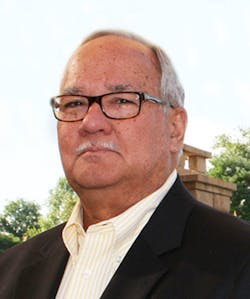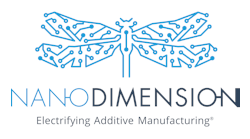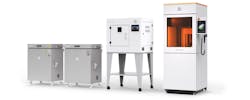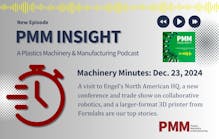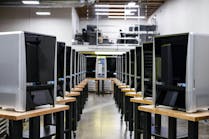Plastics Machinery Magazine senior correspondent Mikell Knights asked an interesting question on the last day of NPE: Are we seeing a change in the way processing machines and auxiliaries are sold? He was referring to the numerous booths that featured complete work cells, frequently with nearly everything built by the same company.
Milacron LLC, Batavia, Ohio, was the best example of this trend with 10 running cells at its NPE booth. Each cell was a complete system.
Mike Prachar, Milacron's VP for global product management, makes a good case that Knights has spotted a trend.
"I do agree the market is moving that way," Prachar said recently. "Processors are looking for solutions that are integrated, not only in installation, but also in the way the equipment works together. In addition, many customers are not resourced to address the complexities of system integration and that is where processing machinery makers offer a tremendous amount of value add.
"When a system is complete and ready for validation or runoff prior to shipment, the customer is able to inspect and validate operation prior to receiving it. So if there are changes to be made, this is done at a manufacturing site which contains engineers and equipment to make it happen. Very different if a processor does this all at their site on their own," Prachar said.
Michael Wittmann, GM of Wittmann Kunststoffgeräte GmbH, Vienna, said his company is very interested in selling complete, integrated processing cells and can support all the equipment since it manufactures everything itself.
But he does not agree there is a clear trend in selling integrated units. "By far, the biggest majority of machines and auxiliary equipment is still purchased separately," Wittmann said.
"Many molders have central drying, conveying and cooling systems. Therefore, auxiliaries like dryers, loaders and possibly blenders are linked to and integrated into the central material handling control and not the molding machines," Wittmann said. "What is left to be part of a 'partial' molding machine work cell are robots and automation systems, temperature controllers and granulators, and possibly intelligent water flow."
Wittmann said he does see a strong trend in the U.S. and European markets of processors buying molding machines and automation systems together. "There are a couple of niche applications — such as micro-molding, multi-component, vertical, special applications with rotary platens and insider solutions such as enlarged guarding of the machine to incorporate the robot, or if the machine supplier offers extensive automation know-how — where molders definitely want to order complete packages."
Joachim Kragl, director of advanced injection molding systems and processing for Engel Machinery Inc., York, Pa., said turnkey systems have been around for quite a while but are not as prevalent as visitors to trade shows might think. "Machinery manufacturers, of course, always want to showcase the perfect solution that is engineered to the last detail at the show, hence the complete cell with all the bells and whistles," he said recently.
"At this point, usually only larger machinery makers approach it this way at times," Kragl said. "It's very hard for smaller companies to justify the extra cost that the project management and carrying the risk that the turnkey provider requires. Plus, many processing companies already have ties with auxiliary suppliers."
Do auxiliary equipment manufacturers agree?
Conrad Bessemer, president and CEO of Novatec Inc., Baltimore, says that in his experience, buying complete cells "is usually done by startups, businesses that are resource-constrained, or where there is an attractive financing package.
"People form their own preferences on all machinery, including auxiliaries, and a lot of that depends on service and local preferences.
"Also, keep in mind that not everybody is running small cells with auxiliaries," Bessemer said. "A major part of our business is with centralized systems — centralized drying, centralized water and centralized conveying."
"The problem is focus with suppliers," he said. "Primary people are good at their selected focus. They tend not to be as good at the other parts. There are some exceptions, but my experience in life is that most of us prefer dealing with specialists that are really top-notch at what they do.
"Most of us in life do our due diligence and buy the best we can in each area from the people we trust or respect the most. Do you really buy everything at one place all the time just for convenience? If all things were equal, perhaps. But they aren't equal.
"In my book, the companies with the most growth on the auxiliary side are specialist companies in water, drying, blending, etc.," Bessemer said. "The processors are voting to buy through specialists that are continually improving their products — as opposed to just making it easy."
That's both sides. What's your preference? Send us an email at [email protected] and let us know how you buy.
Ron Shinn, editor
Ron Shinn | Editor
Editor Ron Shinn is a co-founder of Plastics Machinery & Manufacturing and has been covering the plastics industry for more than 35 years. He leads the editorial team, directs coverage and sets the editorial calendar. He also writes features, including the Talking Points column and On the Factory Floor, and covers recycling and sustainability for PMM and Plastics Recycling.

